I started my first blog in 2006. That single decision changed everything — it opened doors and eventually led me to create WPBeginner, now the world’s largest free WordPress resource site.
I’m Syed Balkhi, and over the years, I’ve built several successful blogs — some of which now generate a seven-figure income. Blogging has completely transformed my life, and I believe it can do the same for you.
If you’re thinking about starting a blog, you don’t have to figure it out on your own. In this guide, I’ll tell you the exact process I use whenever I start a new blog. I’ll walk you through everything, one step at a time.
You’ll also get personal tips I’ve learned from years of real blogging experience — the kind of advice I wish someone had given me when I was just getting started.
Whether you want to blog as a creative outlet, a side hustle, or a business, this guide is your starting point — and you’re starting with the experience of a successful blogger by your side.
Let’s get your blog online — and take that first step together.
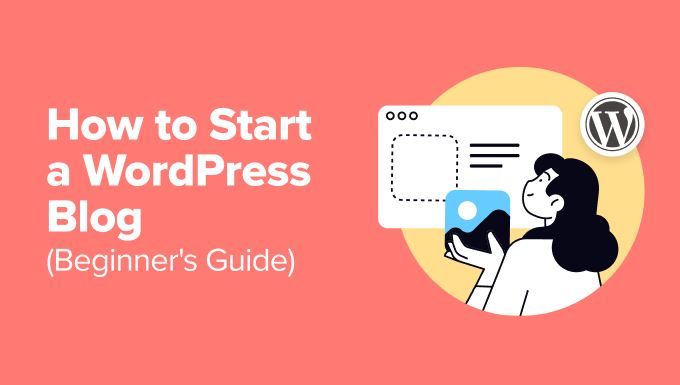
Are you a little nervous about starting your first blog? I promise that the process is easy to follow, whether you are 20 or 60 years old. However, if you need extra guidance, my expert team will help you set up your blog for free. → Click Here to Get Your Free WordPress Blog Setup! ←
What Is a Blog (And Why You Should Start One Today)
Before we get into the steps, I want to take a moment to talk about what a blog really is — and why starting one could be the best decision you make this year.
A blog is a type of website where you regularly publish content, usually in the form of articles or updates. You can use it to share your thoughts, teach something, tell stories, review products, or even run a business.
When I launched my first blog in 2006, I didn’t fully realize the impact it would have.
It started as a way to share what I was learning, and over time, it opened doors I never expected — including turning blogging into a full-time business.
That’s the beauty of blogging. It’s not just about writing. It’s a way to connect with people, build something of your own, and create real opportunities.
Whether you want to blog as a creative outlet, grow a side income, or build a serious online presence — it all starts the same way.
You publish your first post. You keep going. And little by little, your blog turns into something powerful. 📈
In the steps that follow, I’ll show you exactly how I’d start a blog today — using the same process I’ve followed to launch multiple successful blogs. You’ll have my personal tips, tools, and lessons at every step.
And the best part? You don’t need to be a tech expert or a professional writer to get started. All you need is a topic you care about and the willingness to begin.
- Step 1: Picking the Right Blog Niche
- Step 2: Getting Started With Your Blog
- Step 3. Install WordPress Blogging Software
- Step 4: Customizing Your Blog
- Step 5: Writing Your First Blog Post ✍️
- Step 6: Adding Essential Plugins 🔌
- Step 7: Growing Your Blog Audience
- Step 8: Making Money From Your Blog 💰
- Step 9: Mastering WordPress
- Bonus Tip: Explore Niche Blogging Resources
- Frequently Asked Questions About Blogging (FAQs)
- Video Tutorial
- Final Thoughts
Ready? Let’s get started.
💡 Struggling to create a blog? WPBeginner Pro Services can make your dream blog a reality! Our expert WordPress developers will come up with a custom design, including a bespoke homepage and five templated subpages – all at an affordable price. Get Our WordPress Website Design Services Today!
Step 1: Picking the Right Blog Niche
One of the first decisions you’ll make is choosing your blog niche — the main blog topic you’ll write about.
I get asked all the time, “What should I blog about?” My answer is simple: start with something you care about. If you’re passionate about it, you’ll enjoy the process a lot more — and your readers will feel that too.
When I started WPBeginner, I focused on WordPress. I loved helping people learn it, and that gave my blog a clear direction. That passion is what kept me going — even when it wasn’t easy.
Your niche could be a hobby, a skill you’ve picked up, or even something you want to learn more about. Don’t feel like you have to be an expert — just be willing to share what you know and keep learning along the way.
If you’re not sure what to pick, ask yourself:
- What topics do I enjoy reading or talking about?
- What experiences or skills could I share with others?
- Is this something I can write about regularly without getting bored?
- Could this topic grow into a business or attract an audience?
Don’t worry about picking the “perfect” niche on day one. What matters most is starting with something that excites you. You can always refine it as your blog grows.
💡 Bonus Tip: My team put together a list of popular blogging niches that make money. If you need inspiration, it’s a great place to explore ideas.
Step 2: Getting Started With Your Blog
I have seen many users starting their first blog using a free platform. It feels like the easiest option at the time, but it doesn’t take long before they are hit with the limitations.
You couldn’t customize the design, add features, or even fully own your content.
That’s where WordPress comes in.
WordPress gave me full control. I could grow my site, monetize it however I wanted, and build a real business.
It’s the same platform I used to create WPBeginner, and it’s what I recommend to anyone who wants to start a blog the right way. For more details, take a look at my full WordPress.org review.
Here’s why I recommend starting your blog with WordPress.org:
- It’s free and open-source
- You don’t need coding skills
- You fully own your content and site
- You can monetize it any way you like
To get started with WordPress.org, you only need three things:
- A domain name – This is your blog’s name (like wpbeginner.com).
- Web hosting – This is where your blog files are stored.
- 30 minutes of your time – That’s all it takes to launch your blog today.
A domain name usually costs $14.99/year, and hosting starts around $7.99/month. That can add up — especially when you’re just getting started.
That’s why I recommend Bluehost — a hosting company I personally use and trust.
Bluehost has been working with WordPress since 2005 and hosts millions of websites. With Bluehost, you’ll get:
- Affordable hosting with a free domain name
- Fast servers and generous storage
- 24/7 customer support from WordPress experts
- Up to 83% off using my Bluehost coupon
For more details, check out my full Bluehost review.
If you follow this guide and can’t get your blog online within 30 minutes, my team will set it up for you for free. Just contact us using our free blog setup service.
ℹ️ NOTE: If you sign up using my referral link, I’ll earn a small commission at no extra cost to you. In fact, you’ll save money and get a free domain as part of the deal.
To get started, open Bluehost in a new tab and click the green ‘Get Started Now’ button.
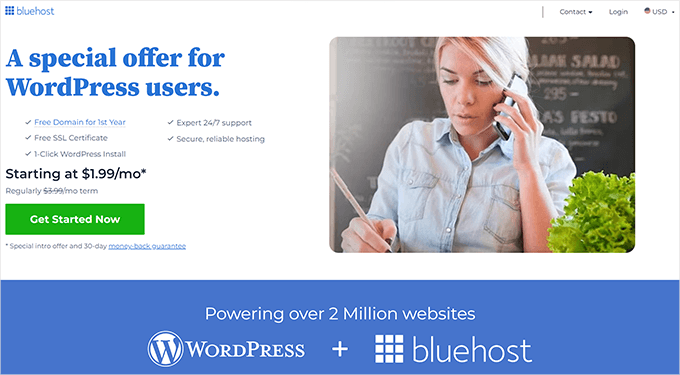
Select the hosting plan you want. Basic and Choice Plus are the most popular options.
Next, you’ll choose your domain name.
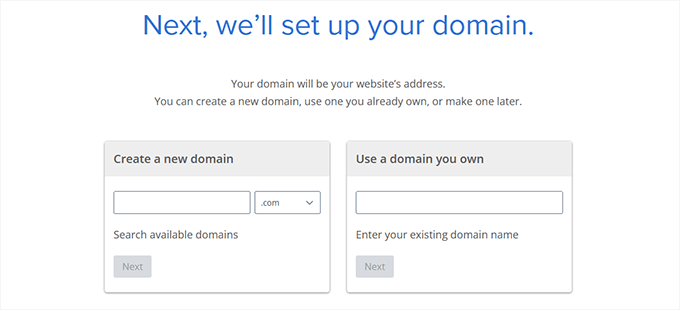
Fill in your account details and finalize your package. I recommend choosing the 12-month plan for the best value.
You’ll see optional extras on the checkout page. You don’t need them right now — you can always add them later if needed.
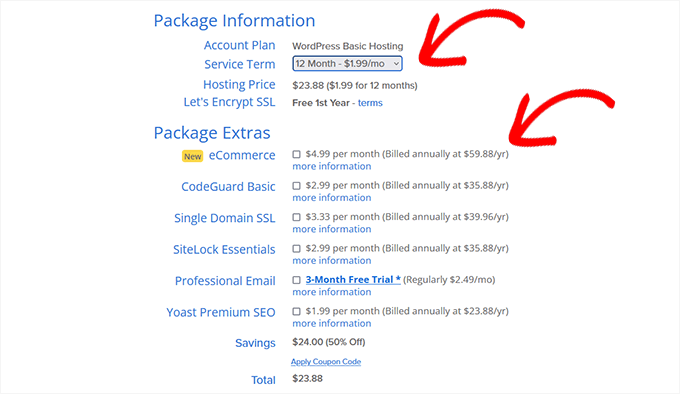
Once your purchase is complete, Bluehost will email your login details. You’ll use these to access your hosting control panel (called cPanel), where you’ll manage your site and install WordPress.
Step 3. Install WordPress Blogging Software
When you sign up with Bluehost using my link, they will automatically install WordPress for you so that you can start building your blog immediately.
Simply log in to your Bluehost account and then click the ‘Edit Site’ button to get started.
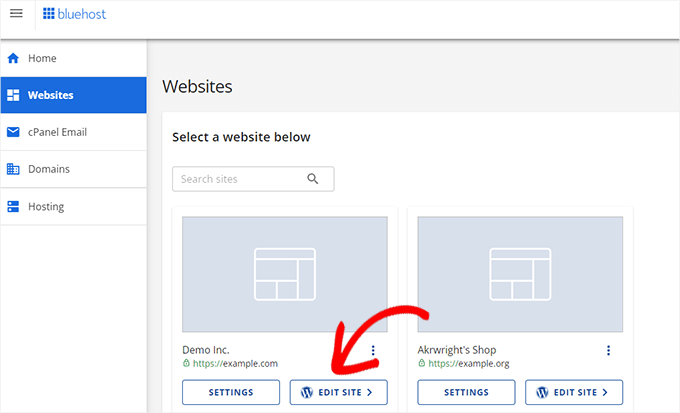
You can also log in to WordPress by going to yoursite.com/wp-admin/ directly from your browser.
If you are using a different WordPress blog hosting service, such as SiteGround, Hostinger, DreamHost, or others, then you can see my guide on installing WordPress for step-by-step instructions for those providers.
That said, I have noticed that most of the above blog hosting companies now automatically install WordPress to help non-techy users kickstart their blogging journey.
Once WordPress is set up, you’re ready to create your blog pages, customize your blog’s design, and start blogging.
Step 4: Customizing Your Blog
When I started my first blog, I spent hours trying to make it look perfect. I wasn’t the best designer, so I experimented with different themes, colors, and layouts.
It felt overwhelming at first, but I quickly realized that simplicity was the key to a great blog design.
Your blog’s design is like the face of your website. It’s the first thing visitors notice, setting the tone for their experience. WordPress makes it easy to create a professional design without needing coding skills.
WordPress themes control how your blog looks. When you first install WordPress, your blog will look plain like this:
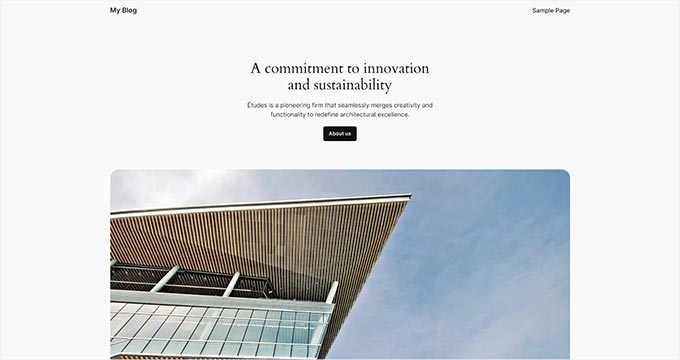
Don’t worry if it’s not what you imagined. WordPress offers thousands of free and premium themes to completely transform your blog’s look.
To get started, go to your WordPress dashboard and click on Appearance » Themes. Then, click the ‘Add New Theme’ button.
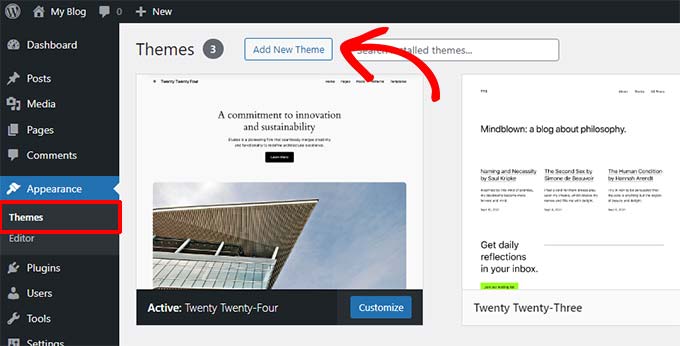
You’ll find over 7,000 free themes in the WordPress.org directory. You can filter them by Popular, Latest, or specific features.
Hover over a theme to see a Preview, which shows how it might look on your site.
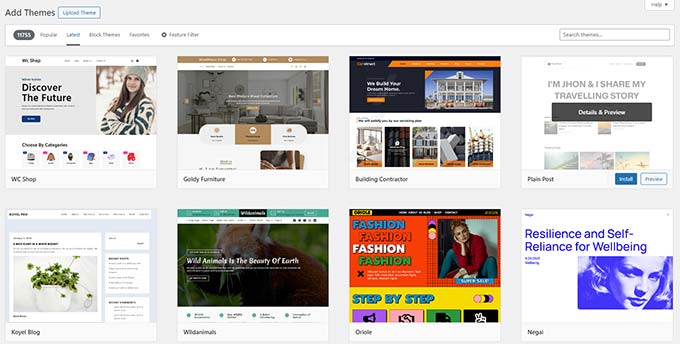
Remember, the preview won’t be perfect until you customize it later.
When you find a theme you like, just click ‘Install.’ Once installed, click ‘Activate’ to make it live on your site.
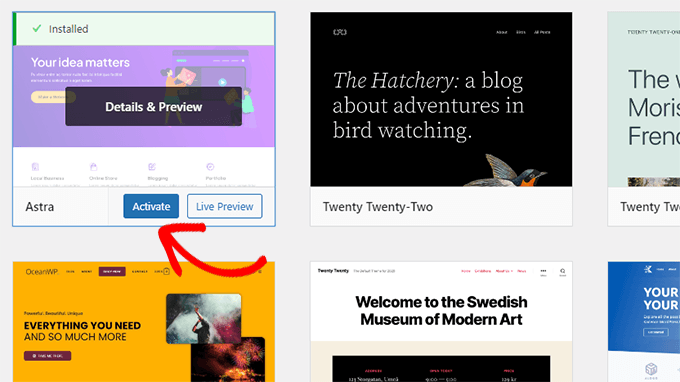
Early in my blogging journey, I realized that less is more when it comes to design. A clean, simple blog not only looks better but also makes it easier for readers to find what they’re looking for.
Once your theme is active, you can go to Appearance » Customize to adjust colors, fonts, and layouts. You can even add your logo to make your blog unique.
If you’re using a block theme, you’ll find the editor under Appearance » Editor.
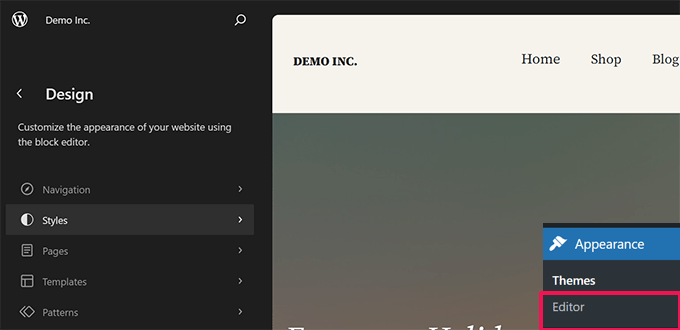
For even more control, I recommend using a page builder like SeedProd or Divi.
I have SeedProd on many of my business websites and blogs. You can read more about it in my detailed SeedProd review.
These tools are called page builders and offer intuitive drag-and-drop interfaces for creating custom designs. You can create custom headers, footers, and layouts without writing any code.
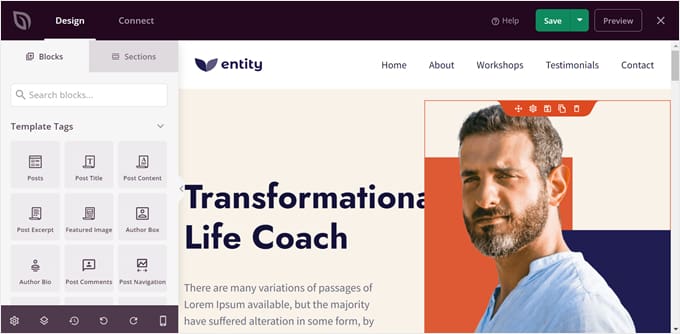
If you’re not sure where to start, check out my guide on selecting the perfect WordPress theme. Keep your design clean and user-friendly, and you’ll be off to a great start.
Once your design feels right, you’re ready to start creating content!
Step 5: Writing Your First Blog Post ✍️
When I wrote my first blog post, I had no idea how much impact it would have. I spent hours rewriting it, trying to make it perfect.
Looking back, I wish I’d just focused on getting it published. The most important step is to start, and WordPress makes it easy to do just that.
To write your first post, go to your WordPress dashboard and click Posts » Add New. This will open the editor, where you can start typing your content.
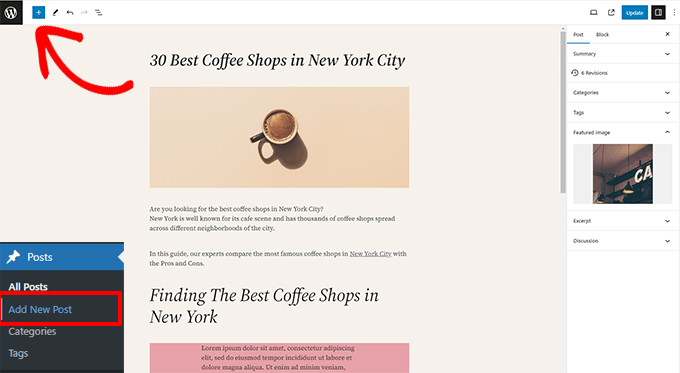
WordPress uses a block-based editor that lets you create beautiful layouts for your posts. It’s simple to use and incredibly flexible.
Check out this complete WordPress block editor tutorial if you need help getting familiar with the editor.
Once you’ve written your post, click the ‘Publish’ button in the top-right corner. That’s it — your blog post is live!
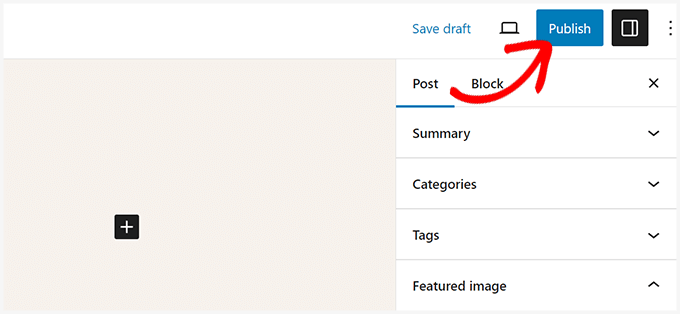
While writing, you’ll notice sections like Categories and Tags on the post screen. These help you organize your content. I recommend reading our guide on the difference between categories and tags to use them effectively.
To get the most out of WordPress’s features, check out our detailed guide on adding a new post. It covers everything from embedding videos to adding headings, bullet lists, and call-to-action buttons.
If you’re struggling with ideas for your first post, don’t worry. Many new bloggers, including myself, face this challenge. Here are some helpful resources:
- Free blog post idea generator tool by WPBeginner
- 130+ blog post ideas that your readers will love
- 50 types of blog topics that are proven to work
- How to write a great blog post (structure + examples)
- How to create an effective content plan in WordPress
I also use keyword research to find even more blog ideas. It helps your content rank higher in search engines and attract more readers. I’ve written a step-by-step guide on how to do keyword research using the same methods I use for WPBeginner.
My advice? Don’t aim for perfection with your first post. Just start writing and hit publish. The sooner you start, the sooner you’ll learn and grow as a blogger.
Step 6: Adding Essential Plugins 🔌
When I first started blogging, I wanted my site to do more than just publish posts. I wanted contact forms, email lists, and other features to help me grow my audience.
That’s where plugins come in. They are like apps for your WordPress website. They let you add powerful features to your site without needing any technical skills.
Today, there are over 59,000 free plugins available in the WordPress directory, so there’s a plugin for just about anything you can imagine. For details, see this article on WordPress plugins and how they work.
If you’re new to plugins, don’t worry. My team has created a step-by-step guide on how to install a WordPress plugin.
Now, let’s look at some essential plugins that every blog should have. I’ll share my personal recommendations based on what’s worked best for me and my audience.
When I first started blogging, I quickly realized I needed a contact form so that users could send me questions, feedback, or reach out about business opportunities. After trying several contact form plugins, I settled on WPForms.
Why I recommend WPForms
- Beginner-friendly with a drag-and-drop builder
- Pre-built templates to save time
- Flexible features that grow with your blog
For a detailed breakdown of all its features, check out my detailed WPForms review.
Pricing: Free Lite Version | Paid version starts from $49.50 / yr
Understanding your audience and tracking your blog traffic is important. I use MonsterInsights, the #1 Google Analytics plugin for WordPress, to monitor traffic and improve my blog content.
Why I recommend MonsterInsights
- Beginner-friendly and easy to set up
- Shows detailed analytics in your WordPress dashboard
- Tracks advanced metrics like eCommerce performance and form submissions
For a full breakdown of its features, check out my detailed MonsterInsights review.
Pricing: Free Lite Version | Paid version starts at $99.60 / yr.
SEO helps bring traffic to your website from search engines. I use All in One SEO on all my blogs. It is the most powerful SEO toolkit for WordPress on the market. It is easy to use, and you don’t need to be an SEO professional to use it.
Why I recommend All in One SEO
- Beginner-friendly setup wizard that simplifies SEO
- Tools for sitemaps, schema markup, and social media previews
- Built-in features for optimizing meta titles and descriptions
For a full breakdown of its features, check out my detailed All in One SEO review.
Pricing: Free Lite Version | Paid version starts at $49.60 / yr.
One of the most important lessons I learned is to always have a backup of my site. Whether you’re migrating to a new host or recovering from an issue, backups are a lifesaver. That’s why I recommend Duplicator, a powerful WordPress plugin for backups / migrations.
Why I recommend Duplicator
- Effortless backups to protect your site
- Simplifies moving your site to a new host or domain
- Creates complete site archives, including files and database
For a detailed breakdown of its features, check out my detailed Duplicator review.
Pricing: Free Lite Version | Paid version starts at $49.50 / yr.
More WordPress Plugins and Customizations
Over the years, I have discovered and used countless WordPress plugins and tools. Now, I have a tested and trusted set of tools that I use on my blogs.
Here are some of the must-have tools I use:
- Security – Cloudflare has a free plan that adds an extra layer of protection to your blog. I also recommend following our WordPress security guide to secure your site.
- Performance – Speed matters for both users and search engines. I recommend WP Rocket (premium) or WP Super Cache (free) to make your site faster. My team has prepared a complete WordPress speed guide with step-by-step instructions.
- Design & Customization – Want to build custom pages without writing code? I use SeedProd and Thrive Architect to design landing pages, custom homepages, and more.
- Traffic & Subscribers – Push notifications by PushEngage are one of my favorite tools for increasing traffic. It’s now one of our top 5 traffic sources on WPBeginner. Follow our guide on adding push notifications.
- Email Marketing – Building an email list is one of the smartest things you can do. I recommend Constant Contact for email marketing. To grow your list, you can use OptinMonster to create high-converting popups and forms.
Still not sure which plugin to use? Visit WPBeginner’s Solution Center, where my team and I have curated the best plugins and tools based on years of experience.
If you’re curious about all the plugins and tools I use to run WPBeginner, check out my complete WordPress toolkit. It lists every tool that has helped me grow WPBeginner into the resource it is today.
For even more recommendations, see my expert pick of must-have WordPress plugins. These tools will make your blog more powerful and easier to manage.
Step 7: Growing Your Blog Audience
One of the most rewarding parts of blogging is building a loyal audience that keeps coming back for more.
When I started WPBeginner, it wasn’t easy to get traffic. Over time, I discovered strategies and tools that made a big difference.
Here’s how you can grow your blog audience using the same methods we use at WPBeginner.
1. Master SEO
Search engine optimization (SEO) is the best way to get free traffic from search engines like Google.
When I started, learning SEO quickly became one of the most effective ways to grow my blogs. However, since then, SEO has become a bit more complicated.
Search engines now use complex algorithms to decide what they will show in the top results. Countless websites are competing with each other for those premium spots.
To deal with this, I use All in One SEO for WordPress. It is the most powerful SEO toolkit for WordPress and I use it on all my websites.
Related: See why I switched from Yoast to All in One SEO (Case study).
Simply install and activate the All in One SEO for WordPress plugin, and it will show you a quick setup wizard. You can follow the onscreen instructions, and everything else will be set up for you.
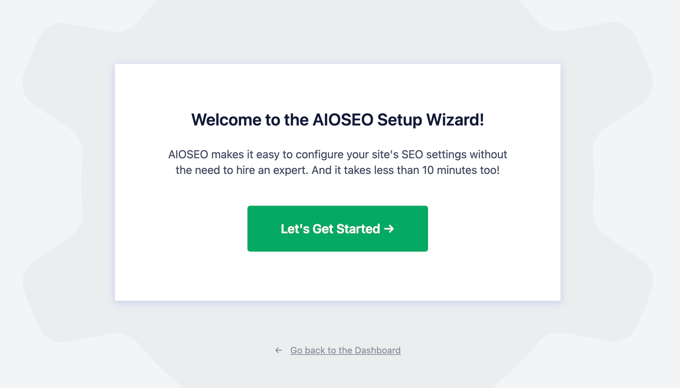
It offers powerful features like SEO meta descriptions, configurable XML sitemaps, full support for schema markup, integration with Google Search Console, and more.
What I love the most about it is that it makes all these technical SEO things plain and simple. You don’t need to be an SEO specialist to use any of these features.
If you’re new to SEO, then I highly recommend checking out my complete WordPress SEO guide, where I have shown step-by-step the SEO setup that I use on all my blogs.
2. Build an Email List
If you ask me about the one mistake that I regret when starting my blogs, I would say not building an email list right away.
At that time, SEO had worked wonders for my blogs, but there was a problem. Users who found my blog from search engines could just leave, and I had no way to reach them.
This is where I discovered that I needed to start building an email list. It has been the best decision for the success of many of my businesses, including WPBeginner.

It allowed me to connect directly with readers and bring them back to the blog. If you’re serious about growing your audience, you need to start building your list today.
To get started, you will need to sign up for an email marketing service. These companies specialize in sending mass emails without triggering spam filters.
I use Drip on WPBeginner. It offers a lot of powerful features for segmenting my audience and personalizing my emails. Plus, it works well with other growth marketing tools that I use.
Related: See why I switched from MailChimp to Drip (Case Study).
That being said, it can be a bit too advanced for beginners, so you may prefer to use Constant Contact instead.
And, speaking of growth marketing — you can’t just add a lonely email signup form to your blog’s sidebar, hoping for users to sign up. You will need to be smart about it and provide your blog readers with plenty of options to join your email list.
The easiest way to do this is to use OptinMonster. It is the best lead generation software on the market, providing powerful tools to convert blog visitors into subscribers.
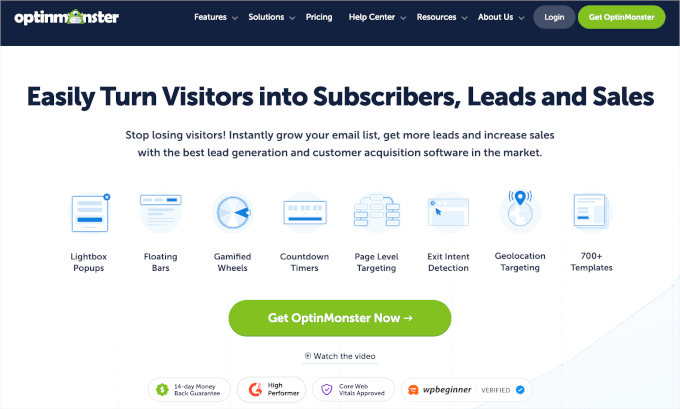
It allows you to create beautiful popups, slide-in forms, countdown timers, and more to nudge users into joining your email list.
I have written about all the proven methods I use at WPBeginner to grow our email list, so you can simply use my strategy.
3. Use Push Notifications
Another technique I use to promote my blogs is ‘Push Notifications’. These are custom messages that you can send as notifications to users’ web browsers on mobile and desktop devices.
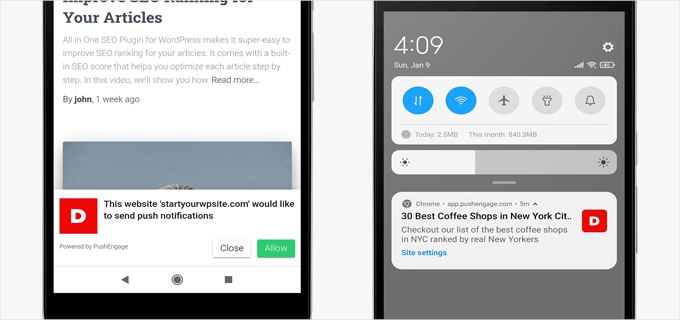
Push notifications are a great way to re-engage visitors after they leave your site.
To get started, you’ll need to sign up for a push notification service. For WPBeginner, I use PushEngage, and it’s now one of our top traffic sources.
PushEngage is super-easy to set up and comes with powerful features like automated notifications, personalized messages, cart abandonment recovery, and custom optin forms.
For more details, see my complete PushEngage review.
My team has also put together a step-by-step tutorial on how to add push notifications in WordPress that you can follow.
4. Leverage Social Media to Build Community
Social media platforms are an important source of traffic and an easy way to promote your new blog.
However, unlike search engines, social media platforms require spending time to build engagement and reach.
Luckily, there are tools like ClickSocial. It allows you to schedule social media posts in WordPress. Simply set it up, and it will automatically post scheduled content to your social media profiles.
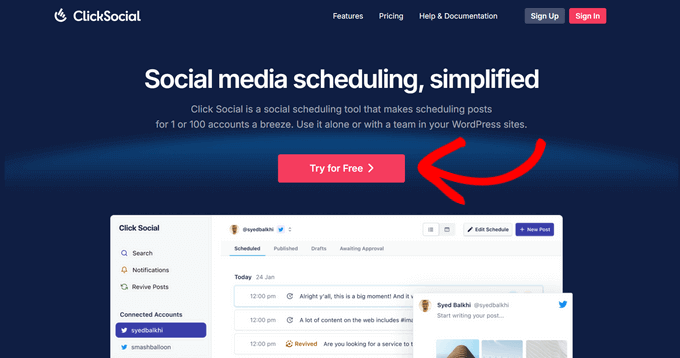
However, social media platforms are a two-way street. While you will want to bring users to your blog, you will also want to increase your following on those platforms.
One way to achieve this is by using Smash Balloon. It is the most powerful social media plugin for WordPress and allows you to easily embed social media feeds into your site.
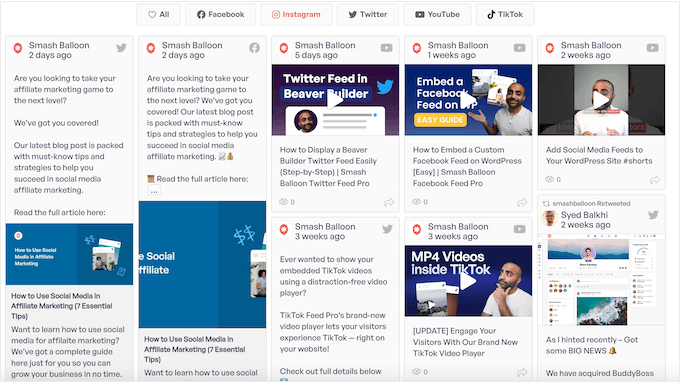
Smash Balloon works with Facebook, Instagram, X (Formerly Twitter), YouTube, and TikTok. It also has a reviews feed add-on, which allows you to display reviews from Google, Yelp, Facebook, and more.
These strategies have been the major sources of traffic on my blogs. However, as you work on your blog you will find other ways to promote and grow it. For some more tips, I recommend our guide on how to increase your blog traffic.
One lesson that I learned over the years is that growth takes time and consistency, so I encourage you to always keep experimenting and learning.
Step 8: Making Money From Your Blog 💰
Whether you are making a blog to generate passive income or simply as a hobby, monetizing helps you make it sustainable in the long run.
Many blogs that started as a hobby are now six-figure businesses, such as Huffington Post, TechCrunch, Mashable, and many more.
At WPBeginner, I use multiple monetization techniques to make the blog sustainable and grow it to its full potential.
Here are the best ways to monetize your blog based on strategies I’ve personally used and recommend.
1. Google AdSense
One of the simplest ways to make money from your blog is by displaying ads. I remember adding Google AdSense to one of my early blogs, and it became an effortless passive income source.
AdSense works as a middleman, connecting you with advertisers who bid on keywords related to your content.
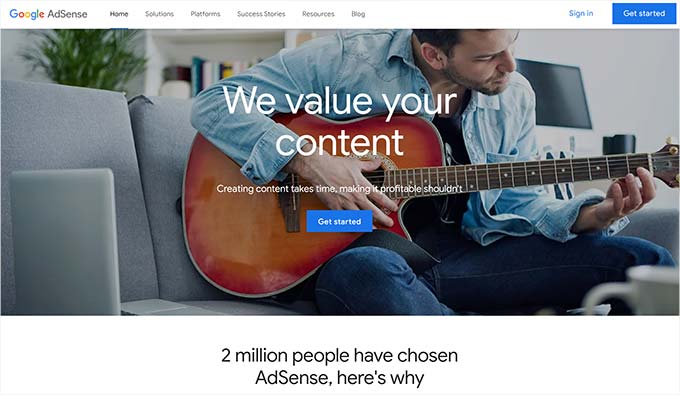
If you want to try AdSense, then my team has a step-by-step guide on how to add Google AdSense to WordPress.
2. Affiliate Marketing
You will notice a disclosure on WPBeginner articles that we earn a commission when you click on a link. This is called Affiliate Marketing, and it is a major source of income for many blogs.
It involves recommending products or services to your readers, and you earn a commission when they make a purchase.
When I started WPBeginner, I focused on promoting tools I used and trusted personally, which made a huge difference in building credibility.
To get started, I recommend using tools like Pretty Links or ThirstyAffiliates to manage your affiliate links.
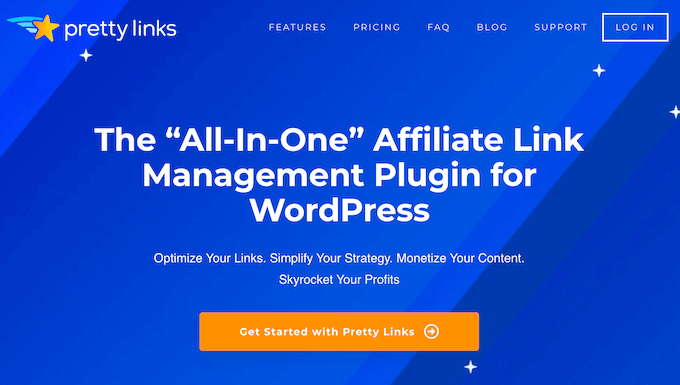
For detailed instructions, you can see our affiliate marketing guide for beginners.
3. Sell Products or Services
Selling products or services is another effective way to make money. Whether it’s physical products, digital downloads, or consulting services, you can use your blog to build a business.
For many of my businesses, I use Easy Digital Downloads to sell digital products and WooCommerce for physical products.
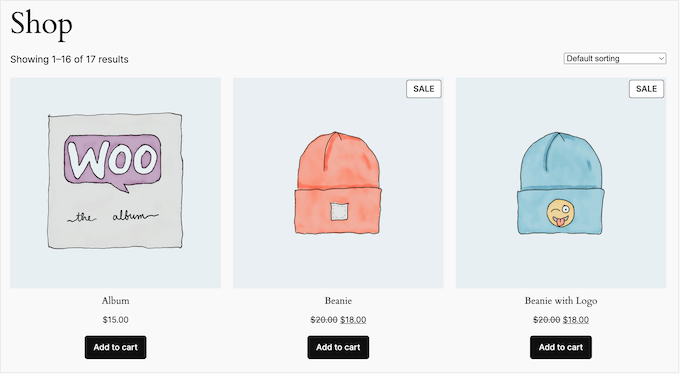
If you’re interested, check out my team’s guides on starting an online store and selling digital downloads.
4. Sell Online Courses and Subscriptions
Another popular way to monetize a blog is by selling premium content or offering online courses.
You can put some of your content behind a paywall for paid subscribers. This enables you to build a community while generating reliable recurring revenue for your blog.
Alternatively, you can offer online courses for a fee or subscription.
The easiest way to do this is with MemberPress. It allows you to easily restrict content, create subscriptions, and sell online courses.
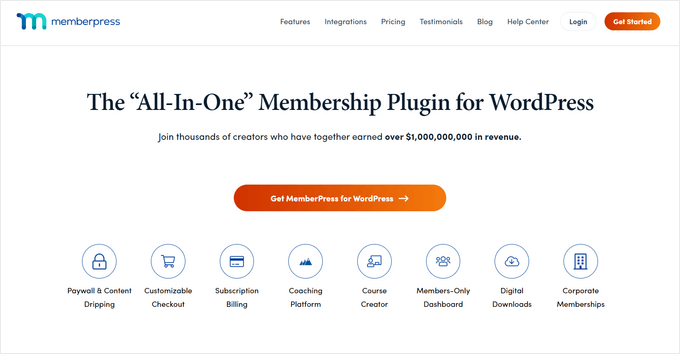
I use MemberPress on WPBeginner’s WordPress video courses website. I have found it to be incredibly easy to create courses, lessons and quizzes, and manage subscriptions.
For more details, see my full MemberPress review.
These strategies have helped me turn my blogs into thriving businesses.
If you want to explore even more ways to monetize your blog, then read this detailed guide on ways to make money from your blog. Remember, there are no shortcuts — hard work and consistency are the keys to success.
Step 9: Mastering WordPress
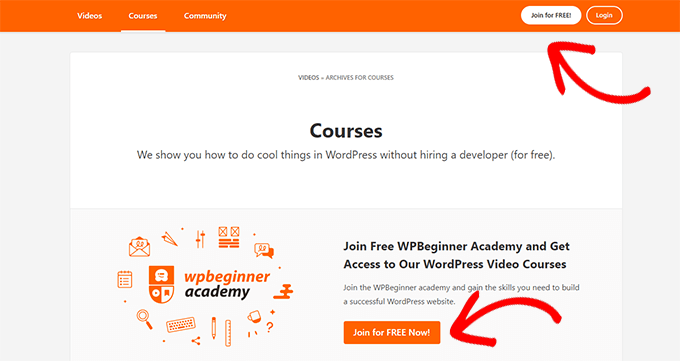
When I started blogging, there were very few resources to help beginners understand WordPress.
I had to learn many things the hard way, often spending hours troubleshooting simple issues. That’s exactly why I created WPBeginner — to make WordPress easy for everyone.
Today, WPBeginner is the largest free WordPress resource site for beginners. Our mission is to empower small businesses, bloggers, and non-techy website owners with easy-to-follow tutorials and actionable tips (see more about us).
To expand your WordPress knowledge and take your blog to the next level, I recommend exploring these resources:
- WPBeginner Dictionary – When I started, I often felt overwhelmed by WordPress terminology. That’s why I created this beginner-friendly glossary to help you quickly understand WordPress lingo.
- WPBeginner Videos – Our free WordPress courses are perfect for beginners. We break everything down step by step, just like I wish I had when I was starting out.
- WPBeginner Blog – This is where you’ll find all our WordPress tutorials, from beginner tips to advanced guides. It’s been my go-to platform for sharing insights and answering user questions.
Learning from others is key to mastering WordPress. I encourage you to join our free Facebook group, WPBeginner Engage. With over 98,000 members, it’s a fantastic community where you can ask questions, share ideas, and connect with like-minded bloggers and WordPress users.
You should also subscribe to WPBeginner’s YouTube Channel. My team regularly shares video tutorials there, covering everything from basic setups to advanced customizations.
One of the simplest tricks I share with new bloggers is using Google to find answers. Just type your question into Google and add “WPBeginner” in front of it. This trick helps you find our guides quickly, saving you time and frustration.
If you still can’t find an answer, don’t hesitate to reach out. You can use the contact form to send me your question. I am always happy to assist.
Bonus Tip: Explore Niche Blogging Resources
People often ask me about what topic they should choose for their blog. I can understand that it can be hard to figure out how you would stand out among so many other blogs.
I have seen many new bloggers switching industries and topics in the same blog. Narrowing your focus can help you build a targeted audience right from the beginning.
To help you explore different niches, I have created a series of guides that show you how to get started in various popular blogging categories:
- How to Start a Travel Blog – Traveling has always inspired people. If you love sharing your adventures, this guide will help you turn your passion for travel into a blog that connects with readers and earns income.
- How to Start a Food Blog – When I see food blogs, I’m amazed at how a recipe can spark so much conversation. If cooking is your passion, this guide shows you how to share recipes and monetize your culinary skills.
- How to Start a Fashion Blog – From sharing outfit ideas to building an audience of fashion enthusiasts, this guide helps you create a blog in one of the trendiest niches.
- How to Start a Video Blog (Vlog) – Video content is booming, and starting a vlog is a powerful way to connect with your audience. I’ve seen bloggers turn video blogs into thriving communities.
- Revealed: Which Are the Most Popular Types of Blogs? – If you’re unsure what niche to choose, this guide will inspire you with examples of popular and profitable blogging categories.
- Best Blogging Niches – 7 That Will Make Money (Easily) – I often recommend this resource to beginners. It highlights niches that are not only enjoyable but also have great monetization potential.
Remember, starting with a niche isn’t just about standing out — it’s about building a community of readers who trust you and come back for more.
I’ve seen countless bloggers thrive by focusing on what they love and sharing it authentically. Explore these guides and see which niche feels right for you.
Frequently Asked Questions About Blogging (FAQs)
Over the years, I’ve answered countless questions from beginners who are just starting their blogging journey. Below are answers to some of the most frequently asked questions I’ve received. I hope these help you get started with confidence.
Can I create a blog without WordPress?
Yes, there are other blogging platforms available. But in my experience, WordPress is the best solution. It offers unparalleled freedom and ownership, which is crucial for building a successful blog. That’s why I always recommend WordPress.
Can I build a blog without hosting?
No, hosting is essential. Web hosting is where your blog’s files are stored. It’s like the home for your blog on the internet. Every blog needs hosting and a domain name to go live.
Is it free to start a blog on WordPress?
WordPress software itself is free, but you’ll need to pay for hosting and a domain name. If you’re on a tight budget, you can start with a free WordPress.com blog, but it comes with limitations. I explain these differences in our guide on the limitations of WordPress.com and WordPress.com vs. WordPress.org.
How do I come up with a good blog name for my site?
Many blogs are named after their creator or the topic they cover. For inspiration, I recommend trying our AI-powered business name generator. It’s an easy way to come up with creative and unique blog name ideas.
What is the best blogging niche?
Choosing the right niche is key to standing out and keeping your blog sustainable. My team has compiled a list of the best blogging niches and the most popular types of blogs. These resources can help you choose a niche that aligns with your interests and has monetization potential.
How much does it cost to start a blog?
The cost depends on the hosting plan and add-ons you choose. We’ve written a detailed guide on how much it costs to start a WordPress blog, along with tips to save money. Most tools offer free trials or money-back guarantees, so you can try them without risk.
Can I start a blog and make money with Google AdSense?
Absolutely. Google AdSense is one of the most popular ways to monetize blogs. It’s easy to set up, and we’ve created a guide on how to add Google AdSense to WordPress.
Can I create a blog and remain anonymous?
Yes, it’s possible. You can use a pseudonym, keep WHOIS privacy enabled for your domain, and avoid sharing personal information or photos. For more details, check out this guide on how to blog anonymously.
Where do I find photos for my blog?
High-quality photos enhance your blog posts and social media content. My team has compiled a list of sources for free, royalty-free stock photos that you can use to make your blog visually appealing.
Video Tutorial
For a complete visual overview of how to start a blog, you can check out our video tutorial:
Final Thoughts
Starting a blog changed my life in ways I never imagined. It began as a small idea and grew into something that has helped millions of people worldwide.
If you’ve followed this guide, then you’ve taken the first step toward creating something amazing for yourself. Congratulations!
Remember: blogging is a journey. There will be challenges, but with consistency, creativity, and the right tools, you can build something truly impactful.
Whether your goal is to share your passion, connect with others, or build a business, your blog can be the foundation for incredible opportunities.
My team and I at WPBeginner are here to support you every step of the way. If you have any questions, need clarification, or want feedback on your blog, don’t hesitate to reach out.
Leave a comment below or use our contact page to reach out. I’d love to hear from you!
If you liked this article, then please subscribe to our YouTube Channel for WordPress video tutorials. You can also find us on Twitter and Facebook.

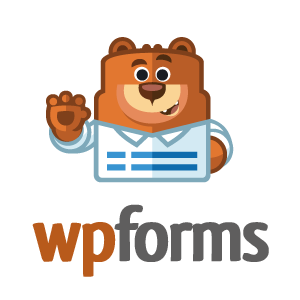


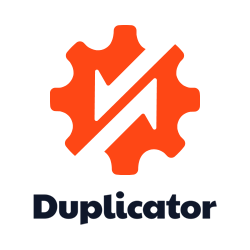
Samshek
That’s a Grate Article
WPBeginner Support
Thank you
Admin
Lebohang
Hi. I recently started a blog with WordPress, just as a hobby because I love writing and found a passion for streetstlye so I would like to get some advice on how I can improve my skills on blogging and if the charges for the domain name will not affect me financially in future once I buy a domain since I am from South Africa and our currencies are different and which is the best domain name to register for
WPBeginner Support
Writing content will help with improving your writing skills. For your domain, there will be a renewal charge to keep the domain. You can take a look at our recommended domain registrars in our article here: https://www.wpbeginner.com/beginners-guide/how-to-choose-the-best-domain-registrar/
Admin
Wan
Awesome… Good info for beginners like me…
WPBeginner Support
Thank you, glad our content can be helpful
Admin
Andres
I created a Contact form with WPForms just like you guys say here but when I create the new Contact page to add the form, the ‘Add Form’ button does not appear on the edit screen. In fact, the other ‘Add Media’ button does not appear right next to it either.
I’ve looked all over for the Add Form button and don’t see it.
Was there a recent update with wordpress? Because the layout I see right now does not match with the pictures in this tutorial.
WPBeginner Support
You’re likely using the block editor: https://www.wpbeginner.com/beginners-guide/how-to-use-the-new-wordpress-block-editor/
When using the block editor there is a WPForms block you can add to select the form.
Admin
Paula
Hi Guys
I’m a little confused, I have a Wordpress Premium Plan and you advise plug ins however, I have to upgrade to allow plugins to a Business Package.
There maybe 55,000 plug ins in the directory but they are no use if I have to go to a lot of expense to use them. This doesn’t seem to appear clear on your instructions
WPBeginner Support
Your confusion is likely due to you being on WordPress.com, our tutorials are for WordPress.org sites. For the comparison, you could take a look at our article here: https://www.wpbeginner.com/beginners-guide/self-hosted-wordpress-org-vs-free-wordpress-com-infograph/
Admin
Thicko
Thanks for this
I will follow this many good.
WPBeginner Support
You’re welcome, glad our guide can be helpful
Admin
Ashish kumar aman
this is one of the best information. when I thought to start blog. I searched 100 time to gain knowledge. Wp beginning gives complete information for beginners. Thanks you so much Team.
WPBeginner Support
Glad our content could be helpful
Admin
yogesh kannam
Great post and advice. Very useful information, it clarified things a lot for us. Thanks for the wonderful blog !
WPBeginner Support
Glad you like our content
Admin
Winston
Hello Syed Balkhi & Team
Thank you for the practical tips you share
I’m looking for a way to create a blog on example.com/blog without screwing up my main site Please how would you recommend I go about it?
If you could guide me with the right steps to take, I’d really appreciate it. Looking forward to hearing from you
Thank you
Winston
WPBeginner Support
If you’re not using your posts for something else, rather than a new site you could create a blog page for your posts to appear on:
https://www.wpbeginner.com/wp-tutorials/how-to-create-a-separate-page-for-blog-posts-in-wordpress/
If you still want to have a different site then you would create a folder named blog in your hosting and install a fresh WordPress site there.
Admin
Tommy
I wanna build up a site simply like you!
what wordpress subject do I pick to make a site like you?
much appreciated ahead of time:)
WPBeginner Support
Our site is based on WordPress tutorials, we would recommend writing about what you’re passionate about
Admin
RoyC
How should I install WP on godaddy if I have a domain purchased there?
WPBeginner Support
You would need to purchase hosting and depending on the hosting type on GoDaddy could change how WordPress would be installed
Admin
Mintu Nayak
Hi,
Can I create a website in my localhost using wordpress and later upload in my domain using wordpress website.
Many thanks
Mintu
WPBeginner Support
Yes you can, we have a guide on how to transfer the local installation here: https://www.wpbeginner.com/wp-tutorials/how-to-move-wordpress-from-local-server-to-live-site/
Admin
Joe
I would like to enlarge the size of my title and tagline. These are entered under “Site Identity” when customizing. There is no function that I can see that will allow this (no “change font size” or “header options”). I’m not familiar enough to enter code, so I was wondering if I should be able to find a plugin that could accomplish this?
WPBeginner Support
For customizing that, you could use a plugin such as CSS Hero: https://www.wpbeginner.com/plugins/css-hero-review-wordpress-design-customization-made-easy/
Admin
Steven Hiatt
So … the process seems very clear. I chose Bluehost, set up an account, bought a domain name, and received their email with directions to log in, which I did. There is no cPanel corresponding to your Step 2, Install Wordpress. Instead, there’s a confusing list of “List to Launch” items, the links for some taking to Wordpress itself, for which you need, apparently, a separate account. There seems to be, at this point, a lot of different ways forward, and it’s hard to know how to choose the right one…
WPBeginner Support
BlueHost has added a built-in installer for WordPress so you can follow the steps in there without creating a new account to set up your site. If you take a look at our video on how to create a website, we cover the new interface that you are likely running into: https://www.wpbeginner.com/guides/
Admin
Vinod Patidar
Great content. You cover each and every step. Thanks for sharing.
WPBeginner Support
Glad you like our content
Admin
nic
I’ve already created a domain using another site, called namecheap. How do I link my domain when creating my blog with wordpress.org? thanks
WPBeginner Support
You would normally need to update your DNS or nameservers to point to your hosting provider to see the site on the host: https://www.wpbeginner.com/glossary/dns/
Admin
Ayush Singh
What if I already have a domain. Since I was on blogger.com an now I want to shift to wordpress so now I already have domain so what should I do?
WPBeginner Support
We have a guide on moving from Blogger that you can follow here: https://www.wpbeginner.com/wp-tutorials/how-to-switch-from-blogger-to-wordpress-without-losing-google-rankings/
Admin
Malcolm
Hi,
I was wondering, I already have a free version of the Wordpress.com blog, and I have about 25 blog articles ready to be released, if I start a domain with blue host will I lose all of those posts? Or would I just have to copy and paste over to the new site
WPBeginner Support
If you only purchase a domain it wouldn’t be a problem, if you’re purchasing hosting and want to make it a WordPress.org site then you could take a look at our article here: https://www.wpbeginner.com/wp-tutorials/how-to-properly-move-your-blog-from-wordpress-com-to-wordpress-org/
Admin
Dipali Matkar
your article is really helpful and you cleared many concepts regarding themes and plug-ins. I am WP beginner and article will help me to build my website good.
Thank You……
WPBeginner Support
Glad our article could help
Admin
lakshya
i wanna develop a website just like you!
what wordpress theme do i pick to make a website like you?
thanks in advance:)
WPBeginner Support
Our theme was one we created custom for our site, we do not have a recommended theme to duplicate the design at the moment.
Admin
Jonalyn Macadine
Thank u so much for sharing these things. I really wanted to learn all about these and it is so easy to understand. Again, thank you so much for the detailed and step by step process. I wanted to become a very good freelancer in the future and this would be my great guide for a beginner like me.
WPBeginner Support
Glad our article could help
Admin
Bilal
Hi Syed ^_^
Very helpful post!
Thank you very much.
Best regards.
WPBeginner Support
You’re welcome, glad our post was helpful
Admin
madisondade
This is really informative post, Thanks for sharing it…
WPBeginner Support
Glad our article was helpful
Admin
Melisa Uzun
Hello i wanna create my own blog site should i use wordpress.com or use it with my own host ?
WPBeginner Support
If you follow the method in this article it would be for creating a site with a different host. If you should use WordPress.com or WordPress.org it would depend on what you’re wanting to do with your site and your personal preference. You may want to take a look at our comparison article here: https://www.wpbeginner.com/beginners-guide/self-hosted-wordpress-org-vs-free-wordpress-com-infograph/
Admin
ARVIND VERMA
very helpful blog for everyone…
WPBeginner Support
Thank you
Admin
Megan Miler
I’ve decided to start a blog…or I decided some time ago but I’m not one to jump into the deep end so i have spent this time learning all I can about all aspects of blogging. I was most concerned about navigating WordPress, not being savvy enough to optimise it or being overwhelmed to the point it never gets started. My gosh I am so glad I happened across this page. I understand things i never thought I would really comprehend. You explain everything so technically but in a simple way that i grasp it. Lol I’m still not jumping in and I am going to continue to read as much as I need to and even after, use your site as my instructions manual when needed. I want to be able to not just set my WordPress site up, but be confident with preceeding with my blog and you have given me resources to gain that confidence. Anyways, thank you once again for this site. You think you are doing a good service for people and you are but I don’t know if you realize how much your work is appreciated so i wanted to give you accolades for it
WPBeginner Support
Thank you, glad our content can be helpful
Admin
Acha Mercy
thank you so much; I’m so glad I can buildmy own blog
WPBeginner Support
Glad our article can help
Admin
Sanj
Hi, I have hosting of siteground which has the option of creating multiple websites. I already have one website. How do i create another one on the same hosting?
WPBeginner Support
If you reach out to the host, they can let you know the current method for installing a second site
Admin
Acha Mercy
this a great place to learn everything from building your blog to sustaining it.
thanks a million
I’m sure in few weeks from now, I will start building my own blog by myself.
WPBeginner Support
Thank you, we hope our content can help you get started
Admin
Meenal
very very useful article. It would help me a lot.
WPBeginner Support
Thank you, glad our article was helpful
Admin
Raymond Hall
I am looking to set up a blog to report on current court cases. I have set up a facebook page and I know my friends can see it, but i’m not sure if others can see it. It appears my privacy settings are open.
I would like to set up blog. What I want to do is charge a small fee to join and follow my blog. Is that possible? I know the newspapers do it.
Thank you for your help.
Ray
WPBeginner Support
For what it sounds like you’re wanting, you would want to take a look at membership plugins: https://www.wpbeginner.com/plugins/5-best-wordpress-membership-plugins-compared/
Admin
Gunter Seydack
Hi Syed,
Being the methodical type, I studied all the information to which you linked me in your emails since the beginning of this week – “to get all my ducks in row”, so to speak. At least in theory, now I now longer feel like the WP Beginner I truly am, but like a WP Expert. The breadth of information you provide is mind-boggling and goes surely far beyond the mere Beginner stage. At least – that’s the impression I gained after having studied “Beginners'”-tips on WP for almost a week before subscribing to WPBeginner, and which was so elementary and uninspiring that I doubted it would be worth my while to switch from DotNetNuke to WP. Now at last I’m all set to start building my WP site.
WPBeginner Support
Glad our content could help get you ready to start creating your site with WordPress
Admin
zara
hi,
what if i don’t have a credit card?
i’m still in the step 1 : setup
WPBeginner Support
If you reach out to the hosting provider, they should be able to let you know the other options they have available.
Admin
Diptimayee Mishra
I have one question. Please give me answer. After submitting articles in article submission websites in off-page seo how I will create link. After Publish option what i will do. Please answer me briefly.
WPBeginner Support
If you’re submitting your articles to another site, you would want to reach out to that site for their available options in terms of SEO.
Admin
Zuryna
How can I do this if I already have a wordpress.com blog?
WPBeginner Support
If you wanted to move your site to WordPress.org, you would want to take a look at our article here: https://www.wpbeginner.com/wp-tutorials/how-to-properly-move-your-blog-from-wordpress-com-to-wordpress-org/
Admin
Unknown
Without Any Views on My Blog, Can I Get Money Just Posting Ads On it.
WPBeginner Support
You would need traffic on your site to start generating money from it.
Admin
Bwirre hubayb
Hello there, I see “blocks” on my blog post, what does it even mean,
Someone created the website for me..
WPBeginner Support
To help understand the blocks in your editor. You would want to take a look at our article here: https://www.wpbeginner.com/beginners-guide/how-to-use-the-new-wordpress-block-editor/
Admin
eve
I found the video SO helpful, honestly am very grateful to have resources such as this! made my website easily within minutes also using bluehost for my domain etc. – and i am not tech savvy at all! thank you!
WPBeginner Support
You’re welcome, glad our guide could help
Admin
Nanette
hiya,
I want to start my blog, have some doubts, however, I want to know how long does it take until I can start earning decent money from my blogs?
WPBeginner Support
There are too many variables to give a definitive date for how long it takes to earn what you would consider decent money with a blog.
Admin
bob z
Hi!
I was following this tutorial and after purchasing Bluehost, this is what you said would happen:
“Once completed, you will receive an email with details on how to login to your web hosting control panel (cPanel). This is where you manage everything from support, emails, among other things. But most importantly, this is where you install WordPress.”
But that didn’t happen for me. It went straight to the “create your password” page and when I did, it took me to a page to pick a Bluehost theme. I didn’t even get to install Wordpress!
What should I do?
WPBeginner Support
From the sound of it, you likely are using the new BlueHost auto installer. BlueHost should have handled the steps involved in installing the site for you and you should have a link to log into WordPress from your BlueHost control pannel.
Admin
Aakarsh
Should we monetize the blog from starting itself or wait for the traffic first?
WPBeginner Support
That would be a question based on your personal preference.
Admin
remote resource
nice post…
WPBeginner Support
Thank you
Admin
Jasna
Hello!
I have a question about hosting. I am planning to start a blog that I wish, over time, would have e-commerce store.
I read about Bluehost that its not very good, or any from EIG.
Which host do You reccomend for Europe (Croatia)?
Thank You in advance.
Jasna
WPBeginner Support
We have not had any trouble with our sites on their hosting but you can find some of our recommended alternatives on our page here: https://www.wpbeginner.com/wordpress-hosting/
Admin
Alakmar Dawoodi
I want to know that can I pay hi hosting charges monthly or I have to pay lump sum amount together.
WPBeginner Support
It would depend on the hosting provider, if you reach out to the host they should let you know.
Admin
syed asma
hi, could you tell me about a plugin or tool that keeps all my data safe even if the site crashes
WPBeginner Support
For that, you would want to take a look at backup plugins. We have a few we recommend here: https://www.wpbeginner.com/plugins/7-best-wordpress-backup-plugins-compared-pros-and-cons/
Admin
Thomas
OMG, I am launching an anonymous activist blog with WP and my brain hurts! And I thought I was pretty good with technology but I have to admit that it’s a bit overwhelming when you start working on it.
WPBeginner Support
It can certainly be daunting in the beginning, for getting started you may also want to take a look at our start here page: https://www.wpbeginner.com/start-here/
Admin
Hannah Jackson
Thanks for sharing, I really appreciate it.
WPBeginner Support
You’re welcome
Admin
Nadine Royster
Thank you for this amazing tutorial. Being new at WP, and pondering over its setup for the last 2 weeks, it made me feel like a pro.
WPBeginner Support
Glad our article could help
Admin
Richie
If I use bluehost as my host and install word press on it, does that mean I also have to pay WordPress for their premium account? Does that make sense? I’m trying to figure out how much the total start up cost will be. If I go with the paid version of WordPress and bluehost, does that mean I am paying both of them?
WPBeginner Support
No, if you have a host other than WordPress.com then you don’t need to pay to use features on WordPress. To help you understand the costs you would want to take a look at our article: https://www.wpbeginner.com/beginners-guide/why-is-wordpress-free-what-are-the-costs-what-is-the-catch/
Admin
Offiong
Please i submitted my site to google ads but was’nt approved. now am asked to enroll in SEO. Please can you tel me more about the SEO and what the charges?
WPBeginner Support
SEO is Search Engine Optimization, you can learn about how you can do it using our article here: https://www.wpbeginner.com/wordpress-seo/
Admin